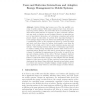Free Online Productivity Tools
i2Speak
i2Symbol
i2OCR
iTex2Img
iWeb2Print
iWeb2Shot
i2Type
iPdf2Split
iPdf2Merge
i2Bopomofo
i2Arabic
i2Style
i2Image
i2PDF
iLatex2Rtf
Sci2ools
HUC
2007
Springer
2007
Springer
Users and Batteries: Interactions and Adaptive Energy Management in Mobile Systems
Abstract. Battery lifetime has become one of the top usability concerns of mobile systems. While many endeavors have been devoted to improving battery lifetime, they have fallen short in understanding how users interact with batteries. In response, we have conducted a systematic user study on battery use and recharge behavior, an important aspect of user-battery interaction, on both laptop computers and mobile phones. Based on this study, we present three important findings: 1) most recharges happen when the battery has substantial energy left, 2) a considerable portion of the recharges are driven by context (location and time), and those driven by battery levels usually occur when the battery level is high, and 3) there is great variation among users and systems. These findings indicate that there is substantial opportunity to enhance existing energy management policies, which solely focus on extending battery lifetime and often lead to excess battery energy upon recharge, by adapti...
Related Content
| Added | 07 Jun 2010 |
| Updated | 07 Jun 2010 |
| Type | Conference |
| Year | 2007 |
| Where | HUC |
| Authors | Nilanjan Banerjee, Ahmad Rahmati, Mark D. Corner, Sami Rollins, Lin Zhong |
Comments (0)

